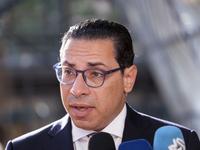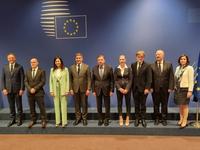Press Releases
03-10-2024 15:06
Press Statement by the Deputy Minister for European Affairs Ms Marilena Raouna at the Press Conference following the MED9 Meeting of Ministers and Secretaries of States for EU Affairs
Dear colleagues,
Members of the Press,
Allow me first and foremost to welcome fellow Ministers and State Secretaries of State for EU Affairs - my esteemed colleagues from across the Mediterranean – in Nicosia – for today’s MED9 meeting.
Cyprus has held the Presidency of the MED9 this year, and our meeting follows the deliberations of the MED9 Ministers of Energy, Agriculture and Environment, Education and Culture. It also comes ahead of the MED9 Leaders’ Summit, on the 11th of October in Paphos.
The MED9 format has become a vital platform for ensuring that the Mediterranean agenda remains at the forefront at the EU level, and for addressing the multitude of common challenges we face as Mediterranean countries.
The Mediterranean is of crucial importance for the European Union. We have seen it time and time again - what happens in this region, directly and significantly impacts the whole European Union.
In this regard, the appointment of a Commissioner for the Mediterranean and the announcement of a new Pact for the Mediterranean have created a renewed impetus and also highlight the strategic importance of this region for the EU, also in the framework of its relations with our Southern Neighbourhood partners.
Our meeting comes at a time of deeply alarming developments in the Middle East – Cyprus’s immediate neighhourhood, and the EU’s neighbourhood.
During our first session we discussed the latest regional developments, particularly in light of the deteriorating situation in our neighbouring Lebanon, the tragic and constantly worsening humanitarian situation in Gaza, as well as Iran’s attacks against Israel that we condemn in the strongest terms, and which constitute a serious threat to regional stability.
We reiterated the importance of a ceasefire across the Blue Line and the full implementation of the United Nations Security Council Resolution 1701, the strengthening of UNIFIL, and establishing the conditions for both Israelis and Lebanese to return in safety to their homes. The sovereignty of both Israel and Lebanon has to be guaranteed. To this end, the efforts of France and the US must be actively supported.
Additionally, we discussed the need for the implementation of the United Nations Security Council Resolution 2735 on Gaza by reaching a ceasefire agreement that secures the release of all hostages while surging the unimpeded humanitarian aid.
We are gravely concerned about the risk of further escalation of the conflict across the region, and its spillovers, including implications on maritime security and freedom of navigation in the Red Sea, and we urge, once more, for utmost restraint.
Now is the time for diplomacy.
Only the reemergence of a meaningful political horizon can provide a viable way out of the crisis. We reaffirmed our commitment to the Middle East Peace Process for a lasting and sustainable peace in accordance with the relevant resolutions of the UN Security Council. This is the way forward, also, towards a lasting stability to the region as a whole.
Cyprus has stood as the EU’s enabling anchor in the region. Part of the solution to the region’s challenges. Following the 7th of October terrorist attack against innocent civilians, and the humanitarian crisis in Gaza, Cyprus delivered the Amalthea maritime corridor to the international community, as a supplementary route for the delivery of assistance to the innocent civilians of Gaza. We have worked closely with regional, EU partners and institutions to operationalise the corridor, in what we consider to be our moral responsibility to the region.
During next week’s Summit our leaders will focus on regional developments. HH the King of Jordan will be attending the summit both to discuss the situation in the Middle East, as well as EU-Jordan relations.
In our second working session, we focused on the MED9 priorities for the new EU institutional cycle. It is essential that the Mediterranean perspective is reflected in shaping EU policies and priorities in the coming years. The EU is entering this cycle in a volatile and highly challenging global geopolitical context. These challenges, alongside issues such as migration, long-term competitiveness, demographic challenges, and sustainable prosperity, directly affect the Mediterranean.
On the Southern Neighbourhood, we underlined our commitment for a stable, integrated, interconnected and prosperous Southern Neighbourhood. Strategic engagement with our southern partners is of utmost importance in this regard.
On migration we emphasised the need for comprehensive policy and a holistic, balanced approach that also addresses the external dimension and root causes of migration.
We have identified the energy sector and climate change as one of our most crucial challenges in the region. The Mediterranean is one of the most vulnerable regions to the impact of climate change. In this regard we reaffirmed the need for a regional alliance to tackle its consequences. Cyprus is relaunching the Eastern Mediterranean and Middle East Climate Change Initiative that includes the implementation of a Regional Action Plan and the establishment of a Regional Scientific Alliance.
During the working lunch we will focus on how to better structure the MED9 to increase its potential.
In closing, I wish to warmly thank you for your participation, and for the fruitful deliberations. From Nicosia, the last divided, under occupation, capital of the European Union, we send a resounding message of unity for a stronger, more resilient Union, that delivers more to its citizens, and in the world.
Thank you.
(EN)
Relevant Press Releases
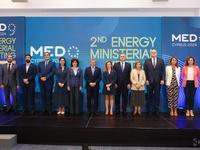
23-09-2024 14:04
Joint Statement of the Ministers of Energy of the MED9
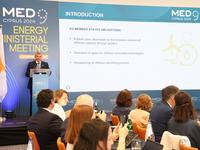
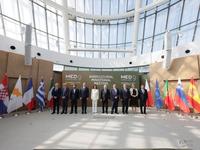
03-09-2024 12:46
Joint Declaration of the Ministers of Agriculture of the MED9
































































































